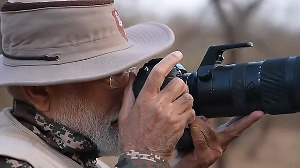'Technology is streamliming the entire process of aid distribution and making it transparent and digital.'

"Importance is given to states/UTs with scarce resources, and to those that may have physical connectivity issues which would cause delays in supply if sent at the last moment," NITI Aayog CEO Amitabh Kant -- who chairs the empowered group on coordination of COVID-19-related relief and response activities -- tells Nikunj Ohri.
How is aid (vaccine, medicines) from abroad being distributed to states?
How is the government ensuring states receive such medical supplies on time, and in a fair manner?
Aid is being sent through three channels -- government, private sector and through states, NGOs and civil society organisations directly to those impacted by COVID-19.
NITI Aayog coordinates with private donors through the CovAID platform, which allows them to fill their intent to donate and track the status of their shipments.
The ministry of external affairs is coordinating with donor countries through the Integrated Covid Aid Tracker.
Two portals have been developed to ensure the process is completely digital, and allocations shall be done by the ministry of health as per a standard operating procedure.
In case of direct sourcing of aid by states/NGOs/CSOs, a nodal officer has been appointed for each state/UT and speedy customs clearance is facilitated.
While allocating, priority is accorded to medical hubs and states/UTs with high-caseloads-which keeps changing because different states are peaking at different times.
Importance is given to states/UTs with scarce resources, and to those that may have physical connectivity issues which would cause delays in supply if sent at the last moment.
A real-time portal has been created to monitor distribution of foreign aid, including vaccines. How is the distribution tracked?
Technology is streamliming the entire process of aid distribution and making it transparent and digital.
Two portals have been developed in partnership with private technology companies like Flipkart, Nagarro, Cloudstack, MapMyIndia, Freshworks, Amazon and Microsoft.
We have onboarded logistic service providers, Indian Air Force, Indian airlines and other stakeholders on to the platforms so that end-mile delivery of aid is smooth and transparent.
Real-time tracking of consignments through the GPS tracking system present in all the trucks is undertaken.
The robust monitoring system not only tracks the location and status of the cargo, but also checks utilisation.
This is done by means of geo-tagged photos and videos, which have to be uploaded by final destination institutions.
How is the government preparing for a potential third wave of coronavirus?
We have to let our current experience guide us.
Streamlined distribution of oxygen and a green corridor for quick transport via road, rail and air are needed.
Our focus should then be on how we prevent hospitals from getting overwhelmed -- this would happen when hospitalisations reduce.
We need early detection of the virus and must make medical advice available without delay.
If correct and timely treatment is not provided, hospitalisations will rise.
Do-it-yourself rapid test kits are now available for testing at home.
And, the vaccination programme needs to be accelerated.
The government has extended grants to Indian vaccine makers to raise production.
Sputnik has been approved and two cargoes have arrived.












 © 2025
© 2025